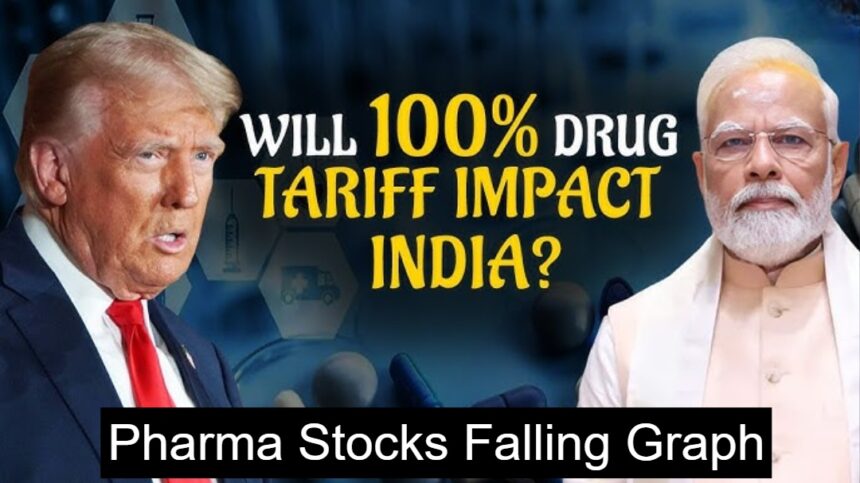After US President Donald Trump declared a 100% tariff on branded and copyrighted medications beginning October 1 unless businesses are constructing manufacturing facilities in the US, Indian pharmaceutical stocks plummeted on Friday. The action rocked the industry and sparked worries about market access and export earnings.
The Nifty Pharma index fell 2.6% as a result of the more than 2% declines in shares of Zydus Lifesciences, Divi’s Laboratories, Ajanta Pharma, Granules India, Alkem Laboratories, and Mankind Pharma, while the shares of Sun Pharmaceutical Industries, Lupin, Biocon, Natco Pharma, Laurus Labs, Gland Pharma, and IPCA Laboratories all fell more than 3% each.
Trump stated on his Truth Social that if businesses have started building a US manufacturing facility or if one is already under development, there won’t be any taxes on pharmaceutical imports.
“Starting October 1st, 2025, we will be imposing a 100% Tariff on any branded or patented Pharmaceutical Product, unless a Company IS BUILDING their Pharmaceutical Manufacturing Plant in America. ‘IS BUILDING’ will be defined as, ‘breaking ground’ and/or ‘under construction.’ There will, therefore, be no Tariff on these Pharmaceutical Products if construction has started,” Trump wrote.
https://truthsocial.com/@realDonaldTrump/115267512131958759
Effects on pharmaceutical businesses in India
According to the Pharmaceuticals Export Promotion Council of India, the US is the largest market for Indian pharmaceuticals, accounting for about 35% of exports, valued at $10 billion in FY25. As a result, analysts believe that the 100% US tariff on branded and patented pharmaceutical products could have a negative effect on Indian pharmaceutical exporters.
Although branded medications are the main focus of the levy, it is unclear if complicated generics and speciality medications will also be impacted, which might provide difficulties for businesses that depend on US exports. Nonetheless, companies who are building manufacturing facilities in the United States will be excluded, providing a chance to reduce tariff risk, according to Maitri Sheth, Pharma & Healthcare Analyst at Choice Institutional Equities.
However, because they are the subject of a different Section 232 inquiry by the US Commerce Department, generics, over-the-counter medications, biologics, and speciality pharmaceuticals are now exempt from the tariffs.
The US gets the majority of its generic medications from India. Exports totalled $3.7 billion in the first half of 2025 alone.
Since the levies target branded and patented medications that are mostly controlled by outside innovators, there will be no immediate impact on Indian pharmaceutical companies. There is also uncertainty about whether complex/specialty generics—an area that Indian players are focussing more on—will be scrutinised in the future. Analysts at Ashika Institutional Research stated that as the US is still the biggest market for Indian pharmaceuticals, any increase in the scope of tariffs might significantly change the growth and export trajectory.
They now think that while operational risk is minimal for Indian exporters, headline risk is significant.
The next flashpoint may be any policy spillover into speciality or sophisticated generics, so we should keep an eye out for that. However, the analysts noted that there are still a number of unclear parts of the statement and that more clarification from authorities is anticipated in the upcoming weeks.
Trump’s 100% tariffs on branded or patented products will or would have an impact on Indian companies like Sun Pharmaceutical Industries, Zydus Lifesciences, and Glenmark (Speciality Innovative brands), according to Rohit Bhat, Research Analyst at B&K Securities.
He stated that Samsung manufactures Ilumya, Sun Pharma’s largest branded patented medicine with $650 million in sales, in Korea, while Winlevi and other brands are produced in the US.
Therefore, Sun Pharma and Biocon are important companies that may be damaged by Trump’s 100% tariff plan. Since their clients would already have their own or third-party CMO production facilities in the US, CDMO players that produce APIs or intermediates for their clients would be less affected. Since Indian generics are off-patented and non-branded medications, they appear to be exempt for the time being, therefore there won’t be any effect on them,” Bhat stated.

